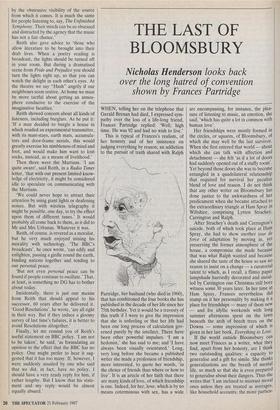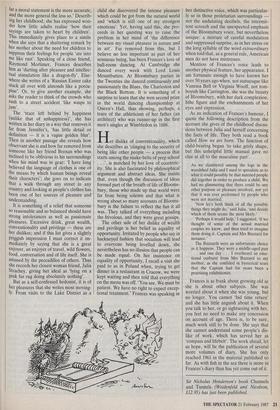THE LAST OF BLOOMSBURY
Nicholas Henderson looks back
over the long hatred of convention shown by Frances Partridge
WHEN, telling her on the telephone that Gerald Brenan had died, I expressed sym- pathy over the loss of a life-long friend, Frances Partridge replied: 'Well; high time. He was 92 and had no wish to live.'
This is typical of Frances's realism, of her honesty and of her insistence on judging everything by reason; an addiction to the pursuit of truth shared with Ralph Partridge, her husband (who died in 1960), that has conditioned the four books she has published in the decade of her life since her 75th birthday. Yet it would be a travesty of this truth if I were to give the impression that she is unfeeling or that her life had been one long process of calculation gov- erned purely by the intellect. There have been other powerful impulses. 'I am a hedonist,' she has said to me; and 'I have always been visually orientated.' Long, very long before she became a published writer she made a profession of friendship, more interested, to quote her words, 'in the choice of friends than where or how to live'. It is an article of her faith that there are many kinds of love, of which friendship is one. Indeed, for her, love, which is by no means coterminous with sex, has a wide arc encompassing, for instance, the plea- sure of listening to music, an emotion, she said, 'which has quite a lot in common with human love'.
Her friendships were mostly formed in the circles, or squares, of Bloomsbury, of which she may well be the last survivor. When she first entered that world — about which she can talk with affection and detachment — she felt 'as if a lot of doors had suddenly opened out of a stuffy room'. Yet beyond those doors she was to become entangled in a quadrilateral relationship that required for survival her peculiar blend of love and reason. I do not think that any other writer on Bloomsbury has done justice to the awkwardness of her predicament when she became attached to the extraordinary triangle at Ham Spray in Wiltshire, comprising Lytton Strachey, Carrington and Ralph.
After Strachey's death and Carrington's suicide, both of which took place at Ham Spray, she had to show another tour de force of adaptation by moving in, yet preserving the former atmosphere of the house, a compromise she made because that was what Ralph wanted and because she shared the taste of the house so saw no reason to insist on a change — a curatorial talent to which, as I recall, a flimsy paper lampshade hurriedly decorated and instal- led by Carrington one Christmas still bore witness some 30 years later. In her time at Ham Spray, Frances nevertheless did stamp on it her personality by making it a place for friendships — many of them new — and for idyllic weekends with long summer afternoons spent on the lawn beneath the arch of beech trees on the Downs — some impression of which is given in her last book, Everything to Lose. If the world outside Bloomsbury can now meet Frances as a writer, what they find, apart from her honesty, are I think two outstanding qualities: a capacity to generalise and a gift for simile. She thinks generalisations are the breath of mental life, so much so that she is even prepared to generalise about their dangers. Thus she writes that `I am inclined to mistrust moral ones unless they are treated as averages, like household accounts; the more particu- lar a moral statement is the more accurate, and the more general the less so.' Describ- ing her childhood, she has expressed won- der how little adults realise 'how their sayings are taken to heart by children'. This immediately gives place to a simile when she says that a shattering remark by her mother about the need for children to suppress their feelings for people 'ate into me like rust'. Speaking of a close friend, Raymond Mortimer, Frances describes him as 'darting after pleasure and intellec- tual stimulation like a dragon-fly'. Else- where she writes of a 'Russian Easter cake stuck all over with almonds like a porcu- pine'. Or, to give another example, she asks the reader to think of the crowds who rush to a street accident 'like wasps to Jam'.
The 'trace left behind by happiness (unlike that of unhappiness)', she has written in her diary in a way that removes it far from Jennifer's, 'has little detail or definition — it is a vague golden blur'. Then in another passage she reveals how observant she is and how far removed from someone like her friend Brenan who was inclined to be oblivious to his surroundings when his mind was in gear: 'I have long believed the language of clothes is one of the means by which human beings reveal their characters'; she goes on to indicate that a walk through any street in any country and looking at people's clothes has been one of her sources of pleasure and understanding.
It is something of a relief that someone so reasonable and so balanced should have strong intolerances as well as passionate pleasures. Excessive drink, great wealth, conventionality and privilege — these are her dislikes; and if this list gives a slightly priggish impression I must correct it im- mediately by saying that she is a great enjoyer, an enjoyer of travel, wild flowers, food, conversation and of life itself. She is amused by the peccadillos of others. Thus she records her closest woman friend, Julia Strachey, giving her ideal as 'lying on a Pink fur rug doing absolutely nothing'.
But as a self-confessed hedonist, it is of her pleasures that she writes most moving- ly. From visits to the Lake District as a child she discovered the intense pleasure which could be got from the natural world and 'which is still one of my strongest emotions'. Yet, having said this, she pro- ceeds in her questing way to raise the problem in her mind of 'the difference between my visual pleasure in nature and in art'. Far removed from this, but I believe no less important as part of her sensuous being, has been Frances's love of ball-room dancing. At Cambridge she danced every week with Lord Louis Mountbatten. At Bloomsbury parties in the Twenties she danced continuously and passionately the Blues, the Charleston and the Black Bottom. It is something of a surprise to learn that she won second prize in the world dancing championship at Queen's Hall, thus showing, perhaps, a trace of the athleticism of her father (an architect) who was runner-up in the first men's singles at Wimbledon in 1886.
Her dislike of conventionality, which she describes as 'clinging to the security of being like other people — a process that starts among the snake-belts of prep school . . .', is matched by her love of eccentric- ity. She is also fascinated by philosophical argument and abstract ideas. She insists that, even though the discussion of ideas formed part of the breath of life of Blooms- bury, those who made up that world were far from being solemn and that what is wrong about so many accounts of Blooms- bury is the failure to reflect the fun it all was. They talked of everything including the frivolous, and they were great gossips.
The other side of her dislike of wealth and privilege is her belief in equality of opportunity. Irritated by people who say in hackneyed fashion that socialism will lead to everyone being levelled down, she nevertheless has no illusion that people can be made equal. On her insistence on equality of opportunity, I recall a visit she paid to us in Poland when, trying to get dinner in a restaurant in Cracow, we were kept waiting and then told that everything on the menu was off. 'You see. We must be patient. We have no right to expect excep- tional treatment.' Frances was speaking in her distinctive voice, which was particular- ly so in those proletarian surroundings not the undulating decibels, the intermit- tent screech and the unexpected emphasis of the Bloomsbury voice, but nevertheless unique: a mixture of careful modulation and suppressed surprise, as in her stress on the long syllable of the word extraordinary when told that, as a general rule, American men do not have mistresses.
Mention of Frances's voice leads to another physical feature, her appearance. I am fortunate enough to have known her over 50 years ago when, not statuesque like Vanessa Bell or Virginia Woolf, not tom- boyish like Carrington, she was the beauty of Bloomsbury, with her dark complexion, lithe figure and the enchantments of her eyes and expression.
As an indication of Frances's humour, I quote the following description from the account she gives of the childhood discus- sions between Julia and herself concerning the facts of life. They both read a book called How we are born. The function of child-bearing began 'to take grisly shape, but this unhelpful little manual gave no clue at all to the masculine part'.
As we clambered among the logs in the woodshed Julia and I used to speculate as to what it could possibly be that married people did together in order to produce a child. We had no glimmering that there could be any other purpose or pleasure involved, nor yet that it was ever performed by people who were not married.
'Now let's both think of all the possible things they might do,' said Julia, 'and decide which of them seems the most likely.'
`Perhaps it would help,' I suggested, 'if we thought of some of the actual married couples we know, and then tried to imagine them doing it. Captain and Mrs Buzzard for instance.'
The Buzzards were an unfortunate choice as it happens. They were a middle-aged pair . . . and one day . . . I overheard an emo- tional outburst from Mrs Buzzard to my mother, as she confided in hysterical tears that the Captain had for years been a practising exhibitionist.
Frances is as frank about growing old as she is about other subjects. She was worried about it when she was young, but no longer. You cannot 'bid time return' and she has little anguish about it. When you talk to her, or go sightseeing with her, you feel no need to make any concession on account of age. There is, to be sure, much work still to be done. She says that she cannot understand some people's dis- like of work, which has served her as 'compass and lifebelt'. The work ahead, let us hope, will be the publication of several more volumes of diary. She has only reached 1961 in the material published so far. As with fish in the sea there is more in Frances's diary than has yet come out of it.
Sir Nicholas Henderson's book Channels and Tunnels (Weidenfeld and Nicolson, £12.95) has just been published.



















































 Previous page
Previous page